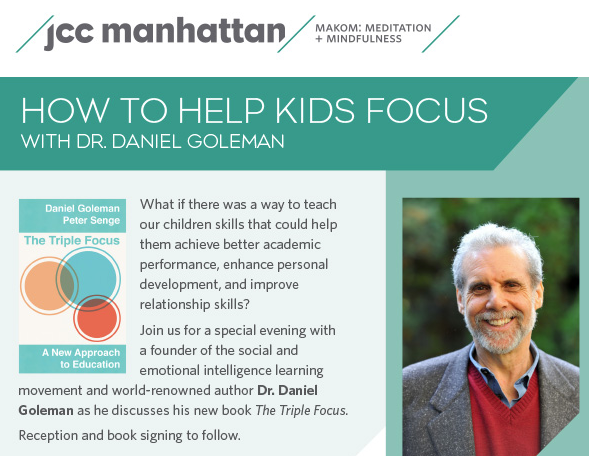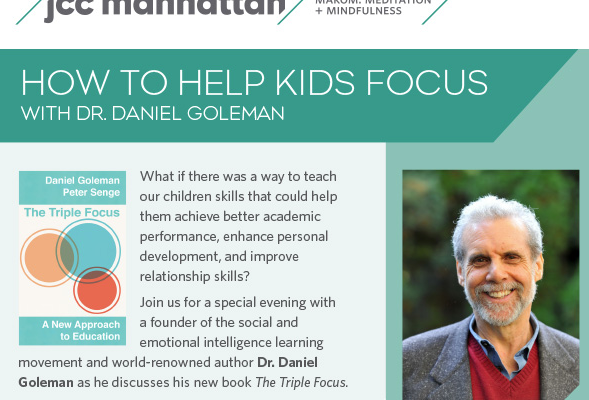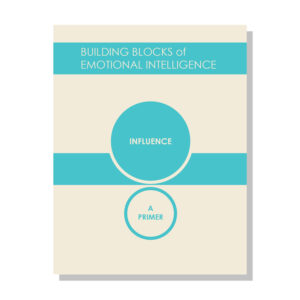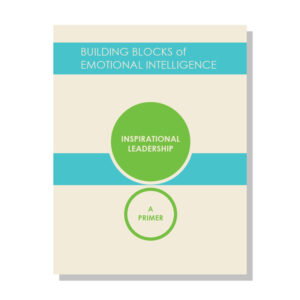

Round-Up: How to Help Kids Focus
November 25, 2014 Time to read: 3 min.What if there was a way to teach our children skills that could help them achieve better academic performance, enhance personal development, and improve relationship skills?
This past Sunday, Daniel Goleman gave a special presentation at JCC Manahattan about his latest book with Peter Senge, The Triple Focus: A New Approach to Education.
More Than Sound was at the talk. We live tweeted some key points throughout the talk. Below are some highlights from the #triplefocus feed, with excerpts from a few of Daniel’s articles for supplemental reading.
A wealth of information means a poverty of attention.
Key takeaway from Pay Attention to Attention:
“…a constant stream of distraction draws attention away from what’s immediately at hand; those seemingly urgent rings and alerts may not be crucial. Working to maintain clear focus on a task – despite intrusions – consistently occupies the brain’s circuitry for attention. “Cognitive effort” is the technical expression for the mental attention demanded to process our information load. Just like the muscles in our bodies, attention can become fatigued. Common symptoms of attention fatigue are lowered effectiveness, increased distractedness, and irritability. These symptoms also indicate depletion in the energy required to sustain neural functioning.”
We need to take back choice when it comes to our attention.
Key takeaway from Think About the Benefits of Unplugging:
“We can be more skillful at not being hijacked by distractions. We may notice them, but there’s a big difference between noticing that something may be occurring, being aware of it, and being hijacked by it, being pulled away from one’s central focus.”
Concentration predicts performance.
Key takeaway from The Benefits of a Productive Cocoon
“We all need a productive cocoon, a time we protect our focus from the multitude of distractions: emails, tweets, updates, and the rest of the onslaught. Teresa Amabile and Steven Kramer, psychologists at Harvard Business School, studied 238 members of teams engaged in creative projects, from designing new kitchen gear to complex information technology systems. The team members kept daily diaries of their work days, including how productive and satisfying they found each day. The most productive and satisfying days, hands down, came when they were able to have unbroken time to focus on their project. These productive cocoons are where they came up with small wins, like innovations, problem solving, and taking concrete steps toward their goal.”
The leader of a group sets the emotional mood of the group.
Key takeaway from Be Mindful of the Emotions You Leave Behind:
“Not all emotional partners are equal. A power dynamic operates in emotional contagion, determining which person’s brain will more forcefully draw the other into its emotional orbit. Mirror neurons are leadership tools: Emotions flow with special strength from the more socially dominant person to the less. Another powerful reason for leaders to be mindful of what they say to employees: people recall negative interactions with a boss with more intensity, in more detail, and more often than they do positive ones. The ease with which demotivation can be spread by a boss makes it all the more imperative for him to act in ways that make the emotions left behind uplifting ones.”
Emotions are contagious.
Key takeaway from How Moods Impact Results:
“While mild anxiety (such as over a looming deadline) can focus attention and energy, prolonged distress can sabotage a leader’s relationships and also hamper work performance by diminishing the brain’s ability to process information and respond effectively. A good laugh or an upbeat mood, on the other hand, more often enhances the neural abilities crucial for doing good work.”
Additional resources:
Raising Students Emotional IQs
PODCAST: Daniel Goleman on The Triple Focus: A New Approach to Education
VIDEO: Peter Senge on Teaching Systems Thinking in Schools







